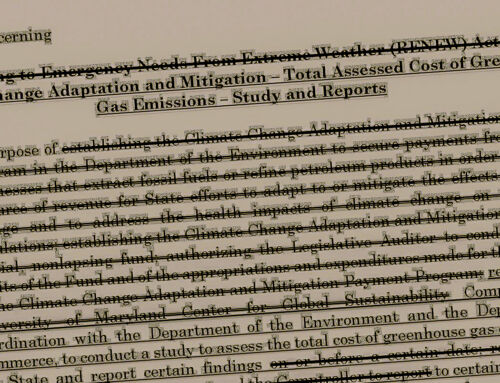View by Topic
Recent Articles
-
EPA Will Keep Current Limits for “Forever Chemicals” in Drinking WaterSaturday, May 24th, 2025
-
Court Indefinitely Pauses SEC Climate Rule LitigationSaturday, May 17th, 2025
-
Maryland is About to Regulate Mold But is the Cart Before the HorseSaturday, May 10th, 2025
-
New Environmental Laws from the 2025 Maryland Legislative SessionSaturday, April 26th, 2025
View by Month/Year
“Green Building Law Update” Headlines
Recent Articles & News from
Stuart Kaplow’s blog
at GreenBuildingLawUpdate.com
- EPA Will Keep Current Limits for “Forever Chemicals” in Drinking Water May 25, 2025
- Court Indefinitely Pauses SEC Climate Rule Litigation May 18, 2025
- Maryland is About to Regulate Mold: But is the Cart Before the Horse? May 11, 2025
- BEPS Redux: The Most Far Reaching Environmental Legislation of the 2025 Maryland General Assembly May 4, 2025
Subscribe to the Green Building Law Update!
Stuart Kaplow brings his expertise and extensive experience to the table with his unique digital publication, "Green Building Law Update". Subscribers receive regular updates to keep them informed about important issues surrounding Environmental Law, Green Building & Real Estate Law, as well as the emerging demand for Environmental Social Governance (ESG).
Get fresh content through the lense of Stuart Kaplow's cutting-edge expertise, innovative commentary and insider perspective. Don't miss another issue! Subscribe below.

California to Delay Corporate Greenhouse Gas Reporting
After this was posted, on September 27, 2024, California Governor Gavin Newsom signed SB 219 into law, making changes to California’s climate accountability package enacted last year, as described below.
In a move that signals a significant shift in the pace of climate reporting laws, California is on the verge of delaying key requirements for corporate greenhouse gas (GHG) emissions reporting. Last Thursday, a legislative committee advanced SB 219, a bill that would slow the implementation of two recently enacted climate disclosure laws. This development has major implications not only for California but for the thousands of companies across the country that do business in California and the untold numbers that do business with a California corporation.
Understanding California’s Climate Disclosure Legislation
California has long been a pioneer in environmental laws, and its Corporate Data Accountability Act and Greenhouse Gases: Climate Related Financial Risk Law are no exception. An analysis of those two laws can be found in our post, California Passes Groundbreaking Climate Disclosure Bills.
Under existing law, the state was set to adopt regulations by January 1, 2025, requiring certain businesses to annually disclose their Scope 1, Scope 2, and Scope 3 GHG emissions. Scope 1 emissions cover direct emissions from owned or controlled sources, Scope 2 involves indirect emissions from the generation of purchased electricity, and Scope 3 includes all other indirect emissions that occur in a company’s value chain.
Key Provisions of SB 219
However, with the advancement of SB 219, these requirements are likely to face delays. The bill proposes pushing back the deadline for adoption of implementing regulations to July 1, 2025. Moreover, the timeline for reporting Scope 3 emissions, which is often the most challenging and complex category, would be delayed further, with a specific deadline yet to be determined.
SB 219 would also amend existing requirements for large corporations, “not just in California, but around the world” disclose climate related financial risks to California authorities, also aligning with Governor Gavin Newsom’s proposed revisions.
The Broader Implications
The passage of SB 219 seems almost certain, especially given Governor Newsom’s recent proposal to delay the reporting deadlines even further, until 2028 for Scope 1 and Scope 2 emissions, and until 2029 for Scope 3 emissions. The governor’s proposal also suggests postponing the requirement for companies to report climate related financial risks until 2028.
This delay in California’s climate reporting legislation comes at a time when the environmental industrial complex faces significant opposition. Various industry groups, including the U.S. Chamber of Commerce, California Chamber of Commerce, and American Farm Bureau Federation, have filed a lawsuit against the state in the U.S. District Court for the Central District of California, challenging the GHG emissions reporting mandates. Additionally, the Securities and Exchange Commission has voluntarily stayed its own rules requiring public companies to disclose GHG emissions, further complicating the regulatory environment. We blogged about the ligation in a post, SEC Climate Disclosure Stay and Venue Now in the 8th Circuit.
A Return to Reality?
When signing the original climate disclosure legislation last year Governor Newsom’s comments foreshadowed the current developments. He said, “.. the implementation deadlines in this bill are likely infeasible, and the reporting protocol specified could result in inconsistent reporting across businesses subject to the measure. I am directing my Administration to work with the bill’s author and the Legislature next year to address these issues.” But he signed the laws anyway?
With SB 219, California is taking a step back to reassess its approach, possibly setting a precedent for other states with ambitious climate reporting mandates, including BEPS mandates.
It has been suggested an amendment will be offered to this bill providing a liability bar and safe harbor for businesses reporting GHG emissions in good faith, even if the data turns out to be flawed, in an attempt to cure a major flaw of the existing laws (.. as well as BEPS laws across the country) that they unconstitutionally compel speech in violation of the First Amendment.
Others have suggested this bill and the underlying laws will be made better with data security protections for GHG emission data.
As California reconsiders its timeline, it’s likely that other states, from Colorado to Maryland can be anticipated to follow suit, slowing down their own climate reporting initiatives. While the delay may frustrate some environmental advocates, it reflects the challenges of implementing GHG emissions reporting (.. and note that these California laws merely require reporting, while BEPS laws and the like in other jurisdictions go further and mandate after reporting that GHG emissions be reduced or in the instance of Maryland eliminated from buildings by 2040) in a complex and varied business landscape.
This bill cannot cure that these laws (as are other BEPS laws across the country) are preempted by federal law and run headlong into the dormant Commerce Clause and broader federalism principles. The courts will no doubt bar governments from enforcing these laws.
Conclusion
SB 219 marks a significant moment in the evolution of climate disclosure laws. The bill’s advancement suggests a growing recognition of the practical challenges involved in GHG emissions reporting. As the legislative process continues, businesses and policymakers alike will be watching closely to see how California’s decisions influence climate reporting mandates nationwide.
In the coming months, the conversation around corporate climate responsibility will likely shift as more states reconsider the feasibility of their own GHG reporting deadlines. While the ultimate impact of SB 219 remains to be seen, it is clear that California’s decision will have ripple effects across the country.









